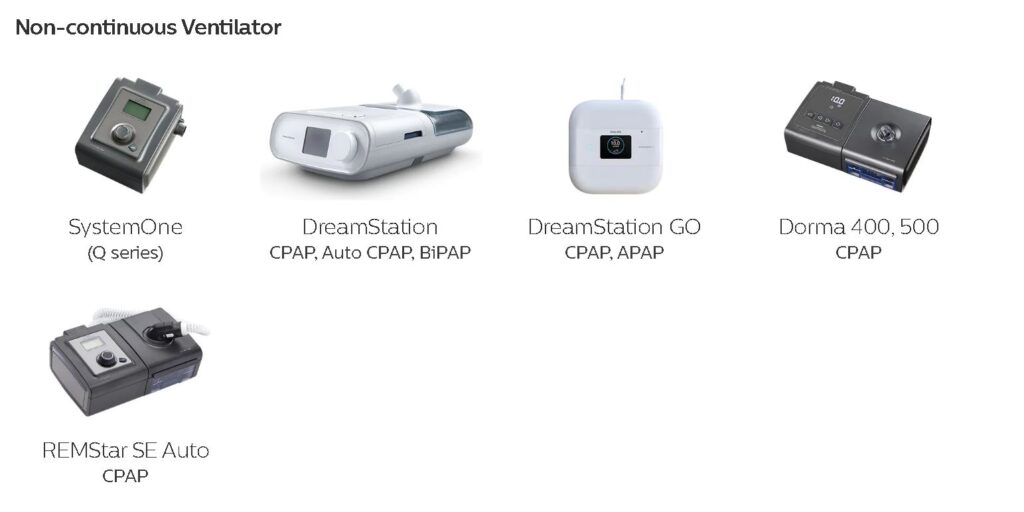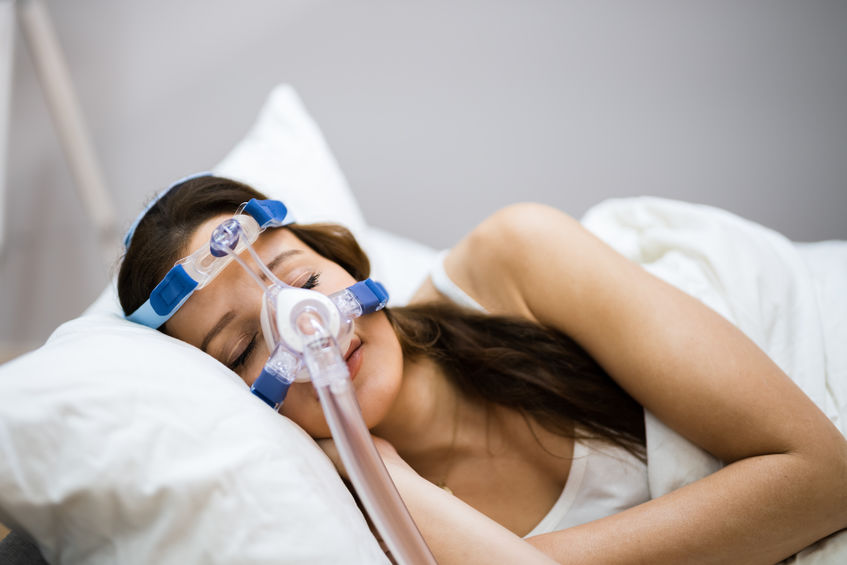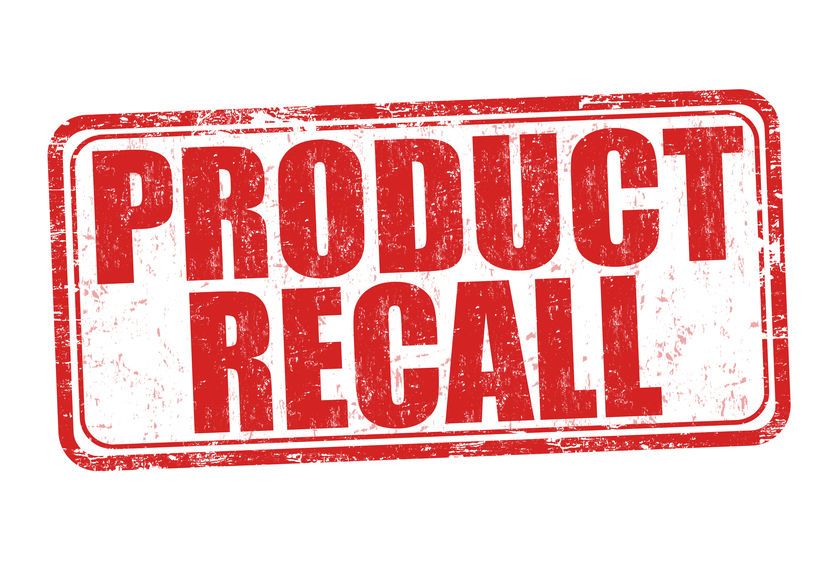For all our patients and CPAP users, we want to inform you that on June 14, 2021, Philips Respironics has recalled various models of CPAPs, BiLevel PAPs, and ventilators (including non-invasive and invasive ventilation). We hope to answer our patients’ most frequently asked questions with this article, but we are also here for our patients 24/7 with any additional issues and concerns.
WHICH CPAP MODELS WERE AFFECTED BY THE RECALL?
The CPAP and BiLevel PAP Devices that are affected by the recall are:
- E30 Continuous Ventilator
- DreamStation ASV
- DreamStajtion ST, AVAPS
- SystemOne ASV4
- C Series ASV, S/T, AVAPS
- OmniLab Avanced Plus In-Lab Titration Device
- SystemOne (Q Series)
- DreamStation CPAP, Auto CPAP, BiPAP
- DreamStation GO CPAP, APAP
- Dorma 400, 500 CPAP
- REMStar SE Auto CPAP
For a full list of Products affected including Mechanical Ventilators, please visit their website: Philips.com.

WHAT INITIATED THE RECALL?
The recall was initiated due to two issues related to the polyester-based polyurethane (PE-PUR) sound abatement foam used in these devices.
“At that time, out of an abundance of caution and based on available information, Philips advised of potential health risks related to sound abatement foam used in specific Philips Continuous Positive Airway Pressure (CPAP), BiLevel Positive Airway Pressure (BiLevel PAP) devices, and Mechanical Ventilators.”
– Philips.com
Possible health risks include exposure to degraded sound abatement foam, for example caused by unapproved cleaning methods such as ozone, and exposure to chemical emissions from the foam material. Philips says potential health risks include that the foam may degrade into particles that may enter the device’s air pathway and be ingested or inhaled by the user, and the foam may off-gas certain chemicals.
High heat and high humidity environments may also contribute to foam degradation in certain regions. Philips has determined that the foam may degrade under certain circumstances, influenced by factors including use of unapproved cleaning methods, such as ozone), and certain environmental conditions involving high humidity and temperature.
The potential risks of degraded foam exposure include:
- Irritation (skin, eye, and respiratory tract), inflammatory response, headache, asthma, adverse effects to other organs (e.g. kidneys and liver) and toxic carcinogenic affects.
- To date, Philips Respironics has received complaints regarding the presence of black debris/particles within the airpath circuit (extending from the device outlet, humidifier, tubing, and mask). Philips also has received reports of headache, upper airway irritation, cough, chest pressure and sinus infection.
WHAT SHOULD I DO IF I AM USING A RECALLED PHILIPS DEVICE?
According to their website, Philips is recommending patients to discontinue use of affected units (for BiLevel PAP and CPAP devices) and consult with physicians to determine the benefits of continuing therapy and potential risks. (Patients using life-sustaining mechanical ventilators should not discontinue use unless advised by their physician.)
Philips is also recommending that customers and patients halt use of ozone-related cleaning products, and adhere to their device Instructions for use for approved cleaning methods.
“For patients using BiLevel PAP and CPAP devices: Discontinue use of affected units and consult with physicians to determine the benefits of continuing therapy and potential risks. For patients using life-sustaining mechanical ventilator devices: DO NOT discontinue or alter prescribed therapy, without consulting physicians to determine appropriate next steps.”
– Philips.com

Everything CPAP is suggesting that each case be handled on an individual basis, to have their physician determine if the benefits of breathing well and sleep quality outweigh the minimal risks of the possible foam degradation. Rather than immediately discontinuing usage, please consult your physician immediately, as your comorbidities should be considered.
If you can get an immediate replacement from your DME Supplier, sending back your recalled machine would be the optimal solution. Unfortunately, due to the Philips recall and manufacturing supply chain challenges due to the pandemic, most replacement models are currently out of stock and backordered.
If you are an established patient at Everything CPAP, know that we have already began the process of getting your machine fixed or replaced. Immediately after the announcement of the recall, Everything CPAP worked with Philips to get serial numbers registered on their secure portal. Patient will soon be receiving further information from Philips regarding next steps.
*Philips has also provided a link for patients to register their devices as well.
HOW DO I SAFELY CLEAN MY CPAP DEVICE?
Everything CPAP has advised all our patients to discontinue using Ozone cleaning devices on all recalled devices as they may be exacerbating the degradation of sound abatement foam in its first-generation DreamStation product family.
For now, use more traditional methods for cleaning your CPAP device and accessories:
- Clean your mask, headgear and tubing once a week to keep it free of dust, bacteria and germs. Fill your sink with warm water with a few drops of ammonia-free, mild dish detergent. Swirl all parts around for five minutes, rinse well and let air dry during the day. Hang the tubing over a towel rack or shower rod to ensure all water drips out.
- Wipe down your CPAP machine with a damp cloth but avoid getting the machine wet.
- Clean the filter by removing it and rinsing it in warm water, and then squeeze in under the water to make sure there is no dust remaining. After, blot down with a clean towel.
- Don’t wash disposable filters but replace once a month. If the filter is dirty or seasonal allergy pollen counts are high, replace sooner than once per month.
- Clean your CPAP humidifier once per week by emptying the water, washing the chamber with warm soapy water. Then rinse well and drain out the water, letting it air dry before placing it back in the CPAP unit. Twice per month, disinfect the humidifier by soaking it with one part vinegar to five parts water solution, then rinse well and place in top rack of dishwasher.
WHAT IS EVERYTHING CPAP DOING TO HELP OUR PATIENTS DURING THIS RECALL?
Our staff at Everything CPAP has spent the past few weeks, reviewing patient files, and working with Philips to register patient devices. Everything CPAP has posted the announcement on our website and has worked to notify patients of the recall and details, advising them of their choices, and answered any of their questions or concerns.
If you have not been notified by our staff and you are an established patient with Everything CPAP, please fill out the form below to notify our staff of your situation. Regardless, if you have been notified before or not, please feel free to use the below form to contact us with questions, concerns or issues you are having with your CPAP Device.
*If you are having trouble breathing or experiencing an emergency health situation, please call 911. If you are having any of the medical symptoms described above, please call your physician immediately.
“Philips deeply regrets the inconveniences caused by this issue, and we are dedicating significant time and resources to give affected patients and customers the service they expect and deserve as we resolve this matter as our top priority.”
In correlation with Philips efforts, we will continue to keep you abreast of any changes, revisions or updates regarding the recall. Please visit our website for further information.
For more information on the recall notification, as well as instructions for customers, users and physicians, affected parties may contact their local Philips representative or visit www.philips.com/SRC-update. Call 877-907-7508 if you cannot visit the website or do not have internet access.
Feel free to call or email us as well, (208) 323-CPAP Extension #2727 or Info@EverythingCPAP.com








